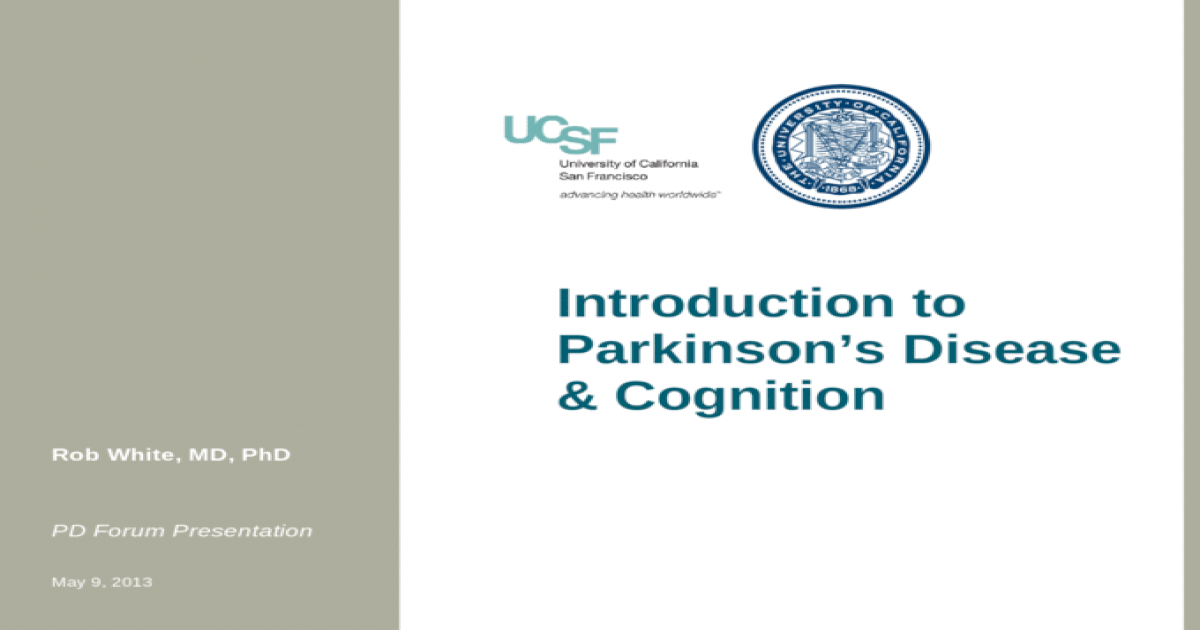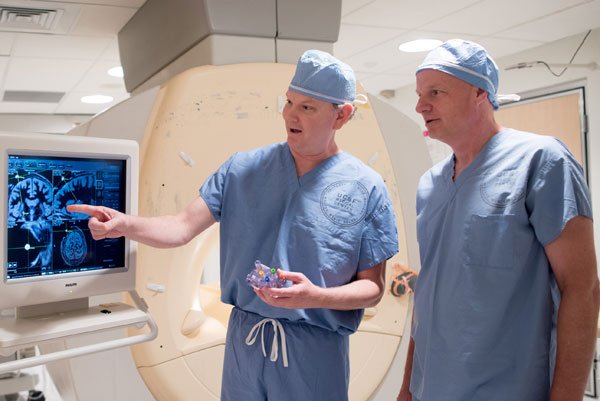A Study To Evaluate The Efficacy And Safety Of Intravenous Prasinezumab In Participants With Early Parkinson’s Disease
open to eligible people ages 50-85
This is a multicenter, randomized, double-blind, placebo-controlled study that will evaluate the efficacy and safety of intravenous prasinezumab versus placebo in participants with Early Parkinson’s Disease who are on stable symptomatic PD medication.
San Francisco, California
Efficacy Safety And Tolerability Study Of Nd0612 Vs Oral Ir
Sorry, in progress, not accepting new patients
This is a multi-center, randomized, double blind, active controlled clinical Study. Following a screening period, eligible subjects will be enrolled to an open-label oral IR LD/CD adjustment period then an open-label ND0612 conversion period then after optimization periods subjects will be randomized to receive either ND0612 or its matching Placebo with IR LD/CD. Subjects can continue to an optional open-label extension period for one year To contact US site near you should go to: www.BouNDless-Study.com
San Francisco, California
Sorry, accepting new patients by invitation only
An extension study for participants who have completed a prior VY-AADC01 clinical study
San Francisco, California
Effects Of Psilocybin Therapy On Sleep And Thermoregulation
We are looking at the effects of psilocybin therapy on two aspects of physiological function: 1) sleep, and 2) thermoregulation. These functions can be disrupted in multiple disorders that involve mood symptoms . For example, people with depressed mood can have impaired thermoregulatory cooling capacity, meaning that they are not as able to sweat in order to cool their bodies down. People with chronic pain can experience disruptions in their sleep after pain-induced awakenings. Participants in our clinical psilocybin trials will have the option of using the Oura Ring, a wearable technology that measures heart rate, skin temperature, respiratory rate, physical activity, and sleep throughout the day and night. Data gathered with the device can help us understand whether psilocybin therapy impacts sleep and/or thermoregulatory capacity. By quantifying changes in key metrics over the course of multiple trials, we hope to gain insights about the physiological dysregulations that underlie mood symptoms as well as the mechanisms of psilocybin’s effects on those symptoms. This study is currently active.
Also Check: Prostate Cancer And Parkinson’s Disease
A Clinical Study Of Nly01 In Patient’s With Early Parkinson’s Disease
Sorry, in progress, not accepting new patients
This is a phase 2 study designed to assess the safety, tolerability and efficacy of NLY01 in subjects with early untreated Parkinson’s disease . Evidence suggests NLY01, a pegylated form of exenatide, may be beneficial in PD and is being developed as a potential treatment for neurodegenerative disorders. For more information, please visit: PrismPDstudy.com
San Francisco, California
Psilocybin Therapy For Chronic Low Back Pain

Sorry, not yet accepting patients
This study evaluates whether psilocybin therapy helps patients cope with chronic low back pain more effectively. Patients may be recruited at Stanford and University of California San Francisco , study procedures will occur at UCSF. Each participant will receive a dose of psilocybin with possibly one or more other drugs. Participants will undergo two preparation sessions, a dosing session, three integration sessions to discuss their psilocybin experience, and several follow up sessions.
You May Like: Bed Sheets For Parkinson’s Patients
Trial Of Parkinson’s And Zoledronic Acid
open to eligible people ages 60 years and up
This home-based study is a randomized placebo-controlled trial of a single infusion of zoledronic acid-5 mg for the prevention of fractures in men and women aged 60 years and older with Parkinson’s disease and parkinsonism with at least 2 years of follow-up. A total of 3500 participants will be enrolled and randomized in the United States. Participants, follow-up outcome assessors, and study investigators will be blinded to assigned study treatment. This trial is funded by the National Institute of Aging.
San Francisco, California
Ucsf Parkinsons Spectrum Disorders Center
The UCSF Parkinsons Spectrum Disorders Center is an integrated and highly collaborative neurodegenerative disorders group that spearheads international research on Parkinsons spectrum disorders leading to improved diagnosis, novel therapeutic interventions, and the training of a new generation of researchers. The clinical and research programs at the center offer the highest level of care and treatment advances to patients with parkinsonian disorders.
Also Check: What Does Carbidopa Levodopa Do For Parkinson’s
Study To Identify Clinical Imaging And Biologic Markers Of Parkinson Disease Progression
Sorry, in progress, not accepting new patients
This is a observational, multi-center study to assess progression of clinical features, imaging and biologic biomarkers in Parkinson disease patients compared to healthy controls and in PD patient subtypes. The primary objective of this study is to identify clinical, imaging and biologic markers of PD progression for use in clinical trials of disease-modifying therapies.
San Francisco, California
A Study To Evaluate The Efficacy Of Prasinezumab In Participants With Early Parkinson’s Disease
Sorry, in progress, not accepting new patients
This multicenter, randomized, double-blind, placebo-controlled, Phase 2 study will evaluate the efficacy of intravenous prasinezumab versus placebo over 52 weeks in participants with early Parkinson’s Disease who are untreated or treated with monoamine oxidase B inhibitors since baseline. The study will consist of three parts: a 52-week, double-blind, placebo-controlled treatment period after which eligible participants will continue into an all-participants-on-treatment blinded dose extension for an additional 52 weeks . Participants who complete Part 2 will be offered participation in Part 3 open-label extension for an additional 260 weeks.
San Francisco, California
Don’t Miss: Can Thyroid Problems Cause Parkinson’s
Brain Wave Recordings Reveal Potential For Individualized Parkinsons Treatments
Pioneering neural recordings in patients with Parkinsons disease by UC San Francisco scientists are providing the groundwork for personalized brain stimulation to treat Parkinsons and other neurological disorders.
In a study published May 3 in Nature Biotechnology, UCSF Weill Institute for Neurosciences researchers implanted novel neurostimulation devices that monitor brain activity for many months, with and without deep brain stimulation therapy. Pairing the brain recordings with wearable monitors of movement, they identified patterns of brain activity corresponding to specific movement abnormalities associated with Parkinsons. Their research provides the first evidence, during normal activities of daily living, for a long-held hypothesis that Parkinsons symptoms are related to erratic brain wave patterns, and demonstrate how DBS restores order to patient brain waves.
We can record hundreds of hours of brain wave activity wirelessly as patients go about normal activities, said Philip Starr, MD, PhD, the Dolores Cakebread Professor of Neurological Surgery at UCSF and senior author of the study. It allows us, really for the first time, to understand the brain activity behind specific neurological problems as they occur in the real world.
Its like the Hubble Space Telescope, said Gilron. We could view the night sky before it, but Hubble allowed us to see much greater detail and volume and it led to unique discoveries. I hope that this technique will as well.
Parkinsons Spectrum Disorders Center
Parkinsons spectrum disorders encompass a set of neurodegenerative disorders characterized by the abnormal accumulation of proteins, including tau and -synuclein. While these disorders differ in their clinical and pathological features, they share important characteristics, including parkinsonian symptoms, cognitive and behavioral decline, and involvement of specific circuits in the brain. In contrast to Alzheimers disease and Parkinsons disease, Parkinsons spectrum disorders have received limited interest from funding agencies and are often challenging to correctly diagnose. There is, as a result, a dire need to study these disorders using a multidisciplinary effort rarely implemented in research or clinical practice.
The UCSF Parkinsons Spectrum Disorders Center is an integrated and highly collaborative neurodegenerative disorders group that spearheads international research on Parkinsons spectrum disorders leading to improved diagnosis, novel therapeutic interventions, and the training of a new generation of researchers. The clinical and research programs at the center offer the highest level of care and treatment advances to patients with parkinsonian disorders.
Read Also: What Is A Dat Scan For Parkinson’s Disease
Adaptive Deep Brain Stimulation To Improve Motor And Gait Functions In Parkinson’s Disease
Sorry, accepting new patients by invitation only
This is a single-center phase I clinical study aiming to improve gait functions in patients with Parkinson’s disease by using adaptive neurostimulation to the pallidum. The investigators will use a bidirectional deep brain stimulation device with sensing and stimulation capabilities to 1) decode the physiological signatures of gait and gait adaptation by recording neural activities from the motor cortical areas and the globus pallidus during natural walking and a gait adaptation task, and 2) develop an adaptive deep brain stimulation paradigm to selectively stimulate the pallidum during different phases of the gait cycle and measure improvements in gait parameters. This is the first exploration of network dynamics of gait in PD using chronically implanted cortical and subcortical electrodes. In addition to providing insights into a fundamental process, the proposed therapy will deliver personalized neurostimulation based on individual physiological biomarkers to enhance locomotor skills in patients with PD. Ten patients with idiopathic Parkinson’s disease undergoing evaluation for DBS implantation will be enrolled in this single treatment arm study.
San Francisco, California
Sorry, in progress, not accepting new patients
This study will investigate cortical stimulation to treat mood and behavioral symptoms in Parkinson’s disease patients.
San Francisco, California
Parkinson Progression Marker Initiative Online

open to eligible people ages 18 years and up
Parkinson Progression Marker Initiative Online is an observational study collecting participant reported information from people with and without Parkinson’s disease , for the goal of better understanding risk and predictive factors for PD. PPMI Online is part of the broader Parkinson Progression Marker Initiative aimed at identifying markers of disease progression for use in clinical trials of therapies to reduce progression of PD disability.
San Francisco, California
Recommended Reading: Parkinson’s Heavy Metal Toxicity
Alzheimers Disease Research Center
In April 2004, UCSF was designated as a national Alzheimers Disease Research Center with the Memory and Aging Center as the central coordinating site. Funded by the NIH, this large collaborative project involves multiple institutions and locations. It is designed to integrate basic science and clinical resources in order to investigate the clinical, molecular, neuropathological and neuroimaging features of Alzheimers disease , non-AD dementias and mild cognitive impairment .
The ADRC has two overarching aims:
The ADRC uses standardized and novel methods to examine patients and biological specimens so that new hypotheses can be tested regarding the cause, diagnosis and treatment of dementia. The ADRC brings together investigators at various locations who are leaders in basic science and clinical research related to dementia. The core project is New Approaches to Dementia Heterogeneity.
Bluefield Project To Cure Frontotemporal Dementia
The Bluefield Project to Cure Frontotemporal Dementia works closely with the Memory and Aging Center to accelerate research to find a cure for frontotemporal dementia . A nonprofit, the Bluefield Project funds collaborative basic, translational and clinical research programs and partners with industry to find a cure for FTD caused by mutations in progranulin.
Recommended Reading: Is Parkinson’s Disease Fatal
California Alzheimers Disease Center
In 1984, the State of California established the California Alzheimers Disease Program through legislation that sought to:
To carry out this mandate, the Alzheimers Disease Program established a network of ten dementia care Centers of Excellence at California medical schools. These California Alzheimers Disease Centers effectively and efficiently improve AD health care delivery, provide specialized training and education to health care professionals and others, and advance the diagnosis and treatment of AD.
Global Brain Health Institute
Global Brain Health Institute works to reduce the scale and impact of dementia in three ways:
The collaboration is co-directed by internationally recognized leaders at the University of California, San Francisco and Trinity College Dublin.
Don’t Miss: What Classes Of Drugs Are Used To Treat Parkinson’s Disease
Randomized Clinical Trial Of Psilocybin For Depression
Recruitment Closed
The purpose of this study is to evaluate the potential efficacy of a single 25 mg oral dose of psilocybin for MDD compared to the active placebo in otherwise medically healthy participants, assessed as the difference between groups in changes in depressive symptoms from Baseline to Day 8 post-dose.
Eighty participants, ages 21 to 65, who meet Diagnostic and Statistical Manual of Mental Disorders criteria for major depressive disorder will be stratified by study site and randomized with a 1-to-1 allocation under double-blind conditions to receive a single 25 mg oral dose of psilocybin or a single 100 mg oral dose of niacin. Niacin will serve as an active placebo.
The Motor Network In Parkinson’s Disease And Dystonia: Mechanisms Of Therapy
open to eligible people ages 21-75
This is an exploratory pilot study to identify neural correlates of specific motor signs in Parkinson’s disease and dystonia, using a novel totally implanted neural interface that senses brain activity as well as delivering therapeutic stimulation. Parkinson’s disease and isolated dystonia patients will be implanted unilaterally or bilaterally with a totally internalized bidirectional neural interface, Medtronic Summit RC+S. This study includes three populations: ten PD patients undergoing deep brain stimulation in the subthalamic nucleus , ten PD patients with a globus pallidus target and five dystonia patients. All groups will test a variety of strategies for feedback-controlled deep brain stimulation, and all patients will undergo a blinded, small pilot clinical trial of closed-loop stimulation for thirty days.
San Francisco, California
Also Check: Physical Therapy And Parkinson’s Disease
Our Approach To Parkinson’s Disease
Designated a center of excellence by the Parkinson’s Foundation, UCSF offers comprehensive evaluations and treatment plans designed to maximize patients’ quality of life. Treatment plans may include medications or surgery alongside physical therapy, nutrition counseling, consultations with speech and swallowing specialists, and integrative medicine services. We also host support groups and connect patients and their families to outside support groups and related services.
Deep Brain Stimulation For The Treatment Of Parkinson’s Disease

Sorry, in progress, not accepting new patients
The purpose of this study is to evaluate the safety and effectiveness of Boston Scientific’s Vercise Deep Brain Stimulation system in the treatment of patients with with advanced, levodopa-responsive bilateral Parkinson’s disease which is not adequately controlled with medication.
San Francisco, California and other locations
Recommended Reading: Glutathione Injections For Parkinson’s
Memory And Aging Center Clinic
The first step to becoming a new patient at the Memory and Aging Center Clinic is to contact our office at 415.353.2057 or have your physician fax a referral to 415.353.8292. Please include the UCSF Medical Center referral form and UCSF Memory and Aging Center Clinic Referral Checklist in the referral.
The UCSF Memory and Aging Center Clinic is located on the UCSF Mission Bay campus in San Francisco and is part of UCSF Health.
Phone Numbers
Randomized Clinical Trial Of Psilocybin For Chronic Low Back Pain
Not open to recruitment The primary purpose of this study is to examine the preliminary efficacy of psilocybin therapy for people with chronic low back pain. Chronic low back pain is the most common musculoskeletal problem and is a leading cause of years lived with disability. There is an urgent need for safe and effective treatments for chronic low back pain. This study examines the effects of a single dose of psilocybin in combination with therapeutic preparation and integration sessions. We hope psilocybin therapy will lead to improvements in pain interference and other cognitive and affective symptoms related to chronic low back pain. This study is estimated to begin in April 2022.
Also Check: Parkinson’s Getting Out Of Bed
Parkinson’s Disease Clinical Trials
The Parkinson’s Progression Markers Initiative Principal Investigator: Caroline Tanner, MD, PhD
A Multicenter, Prospective, Longitudinal, Digital Assessment Study of Disease Progression in Subjects With Early, Untreated Parkinson Disease Principal Investigator: Caroline Tanner, MD, PhD
A Randomized, Double-Blind, Placebo-Controlled, 52-Week Phase II Study to Evaluate the Efficacy of Intravenous RO7046015/Prasinezumab in Participants With Early Parkinson’s Disease With a 6-Year All-Participants-on-Treatment Extension Principal Investigator: Caroline Tanner, MD, PhD
Study In Parkinson Disease Of Exercise
open to eligible people ages 40-80
This study is a Phase 3 multi-site, randomized, evaluator-masked, study of endurance treadmill exercise on changes in the Movement Disorder Society-Unified Parkinson Disease Rating Scale Part III score at 12 months among persons with early stage Parkinson disease. 370 participants will be randomly assigned to 2 groups: 1)60-65% HRmax or 2)80-85% HRmax 4 times per week. The primary objective is to test whether the progression of the signs of Parkinson’s disease is attenuated at 12 months in among persons who have not initiated medication for Parkinson Disease when they perform high-intensity endurance treadmill exercise.
San Francisco, California
Read Also: Parkinson’s Disease Continuing Education Physical Therapy